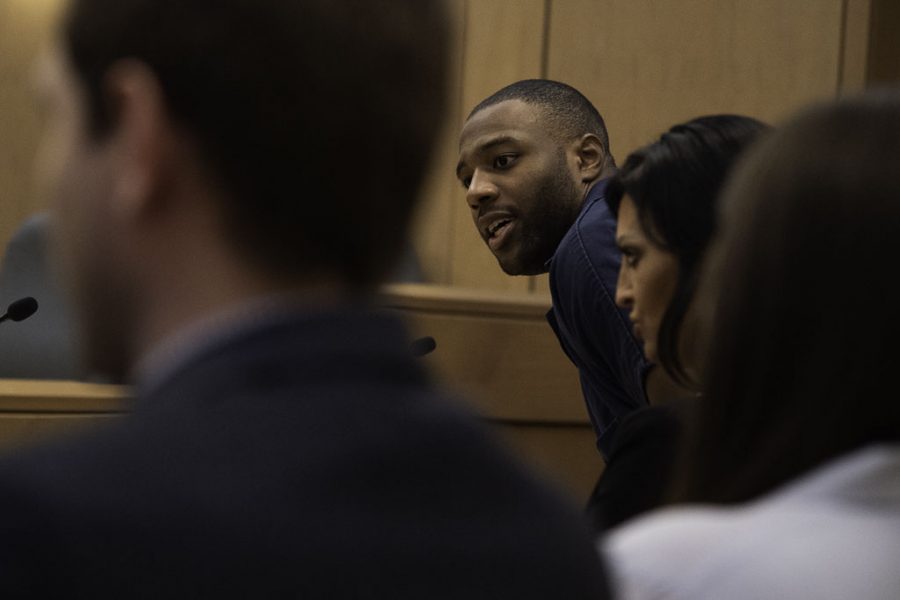Last week, former Utah State University football star Torrey Green was sentenced to 25 years and up to life behind bars for the serial rape of six women. Green committed these crimes between 2013 to 2015 by luring multiple women into his apartment under the pretense of watching a movie after their first date. Once there, he would instead coerce, intimidate and overpower them. Green’s method of attack appears precise and honed by habit — the way he dismissed their refusals and the first date assaults — each accuser providing strikingly similar reports of his disarming charm.
The details from the trial are visceral. Difficult to forget, disturbing vignettes of Green’s actions remain in one’s head long after reading. While testifying in his defense, Green painted himself as a different character — one who had stumbled into quite the misunderstanding with these women by “breaking their hearts” through his failure to communicate that he was not looking for a lasting relationship. He claimed that he has respect for women, and even as his lawyer argued his case by framing his accusers as jealous women who were “needing attention.”
Brushing off accusers as manipulative, vengeful schemers is a textbook attempt to parry accountability. Discrediting the accusers creates a counter-narrative, where the student athlete, business mogul, political candidate — his reputation and hopes of success dashed — is the real victim. While it is necessary that the defendant is considered innocent until proven guilty, there are some cases where subconscious bias offers additional legitimacy to his perspective.
This is caused by the societal benefit of the doubt that men are often afforded. While the courts work to neutralize bias within the sentencing process, they are not so removed as to operate in a vacuum devoid from the influence of gendered perception. Even within the context of a serious sexual crime, male defendants are often described as a beloved son, an attentive teacher, the polite neighbor boy, a sharp student with potential or a father who works hard to support his family.
During the trial, there is often a discussion of the future. On one hand, there is the trauma that may follow a survivor of an assault, affecting their lifestyle, emotional well-being and relationships. On the other, there is a price that must be paid by the perpetrator, even if it affects an educational opportunity or a successful career. Unfortunately, by emphasizing the humanizing characteristics of men who have committed violent sexual crimes while questioning the veracity and morality of their victims, the potential losses of a perpetrator are given undue attention.
By arguing that he was destined for the NFL and that he should be playing football instead of defending himself in court, Green’s attorney appealed to the idea that a man’s professional future is reason enough to excuse him of his crimes. However jeopardized by his own decisions, his potential provides sufficient justification for leniency. This neglect is what predators count on and what victims expect.
By no means a happy story, the sentencing of Green is justice served — to the extent that the courts can truly hold a person accountable for the life-altering trauma they have inflicted upon six other beings. Yet, it so easily could have gone the other way, as many court rulings on sexual assault do.
Last December, former Baylor University fraternity president Jacob Anderson evaded jail time by taking a plea deal for raping a female student at a party. A month before, Brian Varela was sentenced to only 34 months for raping a young woman as she died from a drug overdose, a crime more heinous than the current Washington state law could adequately address. Brock Turner, whose infamous case provided a defining example of lenient sentencing, spent only three months in jail for assaulting an unconscious woman behind a dumpster.
Back in 2016, Turner released a statement with a lackluster apology that blamed alcohol and university “party culture” for his decision to assault and attempt to rape. Many men accused of sexual harassment or assault make a point to identify some external, situational cause behind their actions to explain that they do not see themselves as predators. The accused “doth protest too much” when it comes to obvious serial abusers such as film producer Harvey Weinstein or comedian Bill Cosby. Self-proclaimed honor from an unreliable narrator is strangled when uttered from beneath a mountain of credible evidence.
Other cases are less cut-and-dry — not about whether the crime was committed, but whether the accused believes that what they did was harassment or assault. While this is an obvious rationalization from someone facing heavy consequences and a tarnished reputation, it is quite revealing about the way they move within the world and how they view themselves and the women around them.
Whether they are accused of groping or exposing themselves to a coworker or forcibly raping a romantic partner, the line is always blurred from the perspective of the predator. Rather than cornering a woman in the workplace, they were “having a little fun.” If they forced a date to perform unwanted sexual acts, it was only because they couldn’t tell that they were uncomfortable or that she “secretly wanted it.” If rationalization does not work, they begin to attack the character of their victims, using a woman’s apparel, alcohol consumption or personal past to justify themselves. Perhaps, on a base, subconscious level, some men understand that they are simply more likely to be believed in a “he said, she said” situation, and they choose to maximize their hand.
This is rape culture. It protects men from the consequences of their actions and it further victimizes women who are at their most vulnerable state. The systemic devaluing of women begins early — it is found in dress codes that prioritize female modesty over their education, in media that objectifies female bodies, in a lack of resources for female students and young professionals and in stereotypes that minimize female intelligence and capability. On the other side, men are brought up seeing their masculine qualities portrayed as the default of vision and strength. When they do make mistakes that harm others, it is not considered intentional because “boys will be boys,” and sometimes they play rough.
Women are aware of this, whether or not they have personally experienced sexual assault themselves. They learn to minimize the risk of assault by policing their own behavior because they know that on the other side, their behavior is what will be used against them. Survivors of sexual assault are often hesitant to come forward because they understand the odds. Despite up-ending their private lives in order to bring a sexual predator to justice, there is a chance that their claims will still not be taken seriously enough in court. Despite the increasing awareness around sexual assault through media campaigns like the MeToo movement, the risk of becoming a public target after unmasking an abuser remains.
Women who speak out against abusers are often told that they have misread the situation. Their version of the story might be withered by that of the bright young man they have accused. “He does not look like the type of man who would attack behind closed doors,” nor would he need to — he has the world at his feet. The disbelief toward women following their public accusations of high-profile men likely influenced the expectations of Green’s accusers. Several waited to report. One was reluctant to “ruin his career,” while another said, “The reason I came forward was not a cry for attention … It was a call for action.” Multiple accusers said that the reason they notified authorities was that they had heard that a different woman had accused Green of a similar assault and that they wanted to protect other women from experiencing the same thing.
Most telling was an accuser’s admission was that she was stunned when she first heard the guilty verdict. Perhaps in her mind there was a chance that Green would receive a lenient sentence like so many talented, promising young men before him. I must admit that I caught myself thinking something similar as I read Green’s version of events and heard about his budding football career. Even though the six accounts were so similar, so obviously describing the same realistic, replicated method of attack, I was not sure that it would be enough.
So deeply do these little, accumulated lessons about hierarchy twist into the mind. The same experiences that cause women to doubt justice are the ones that help some men evade it. While it matters immensely that Green, and many others like him, have been held accountable, the fact that women doubt the possibility of these sentences — even as they are being given — is indicative of a much larger societal problem.














patrick a shea • Apr 19, 2019 at 6:35 pm
Elise, You mentioned the Brock Turner case at Stanford. As one of his lawyers in post conviction analysis, you should know the Judge, who presided over the entire trial, recognized the Mr. Turner did not have competent counsel and there is strong evidence that there was collusion between the prosecutor and a Stanford law professor who propagandized this case for her own personal gain. It is extremely important in this difficult area to understand/evaluate the entire story not just one that appears on the unedited Internet. Yes, there are people like Green who deserve punishment, but to confine them for life is not a remedy for maintaining an equitable social contract. I hope you will take the occasion to more carefully review Brock Turner’s case and the many injustices which occurred to both Mr. Turner and Judge Persky, the judge who presided over the trial and sentencing. Life is rarely binary, it is often complex variations of grey.